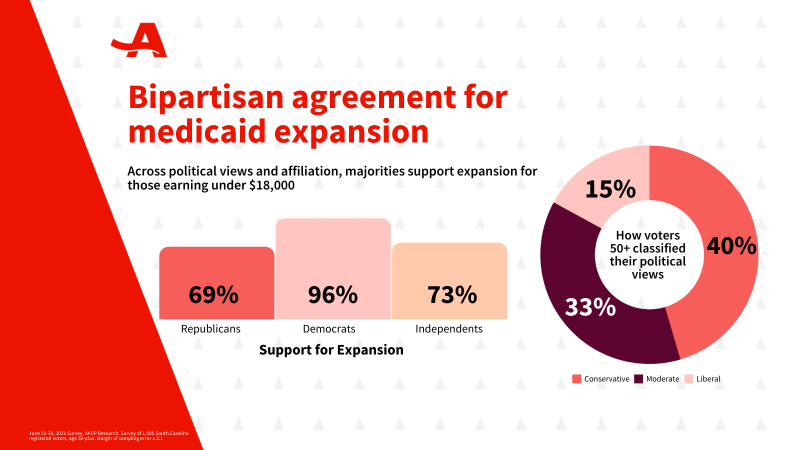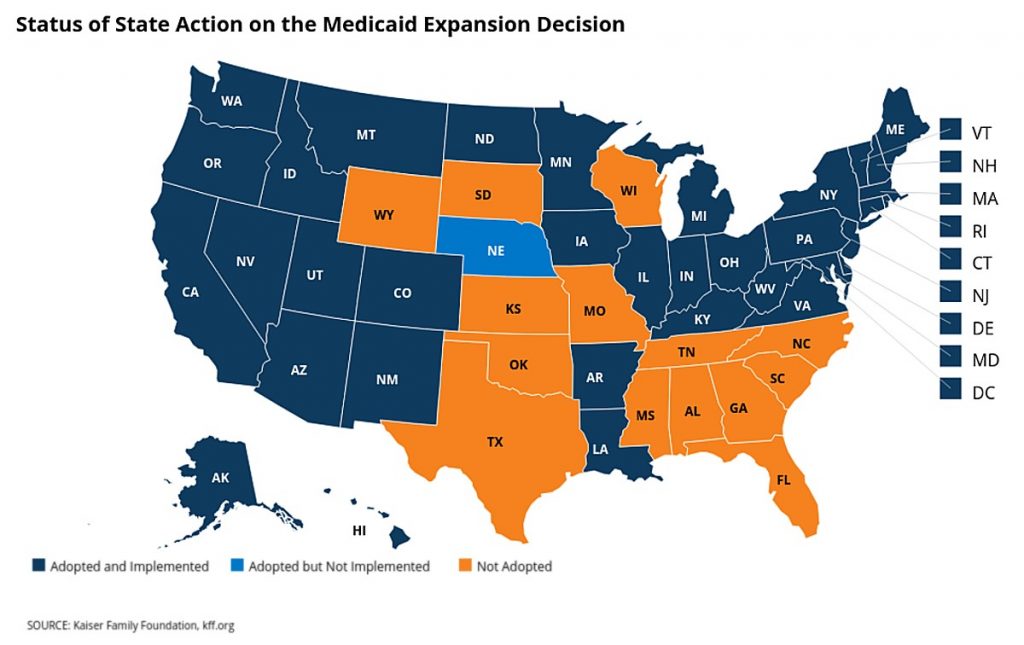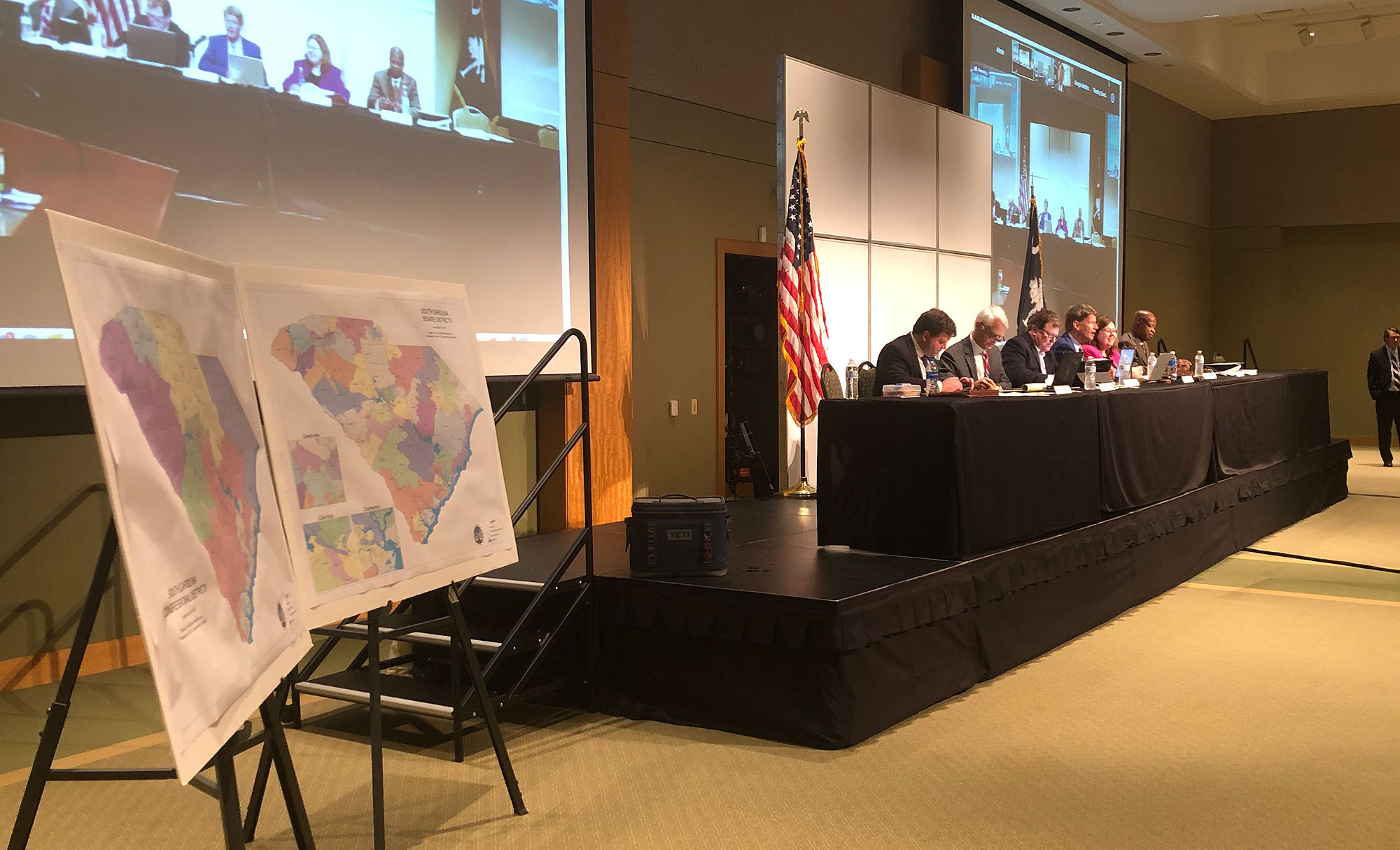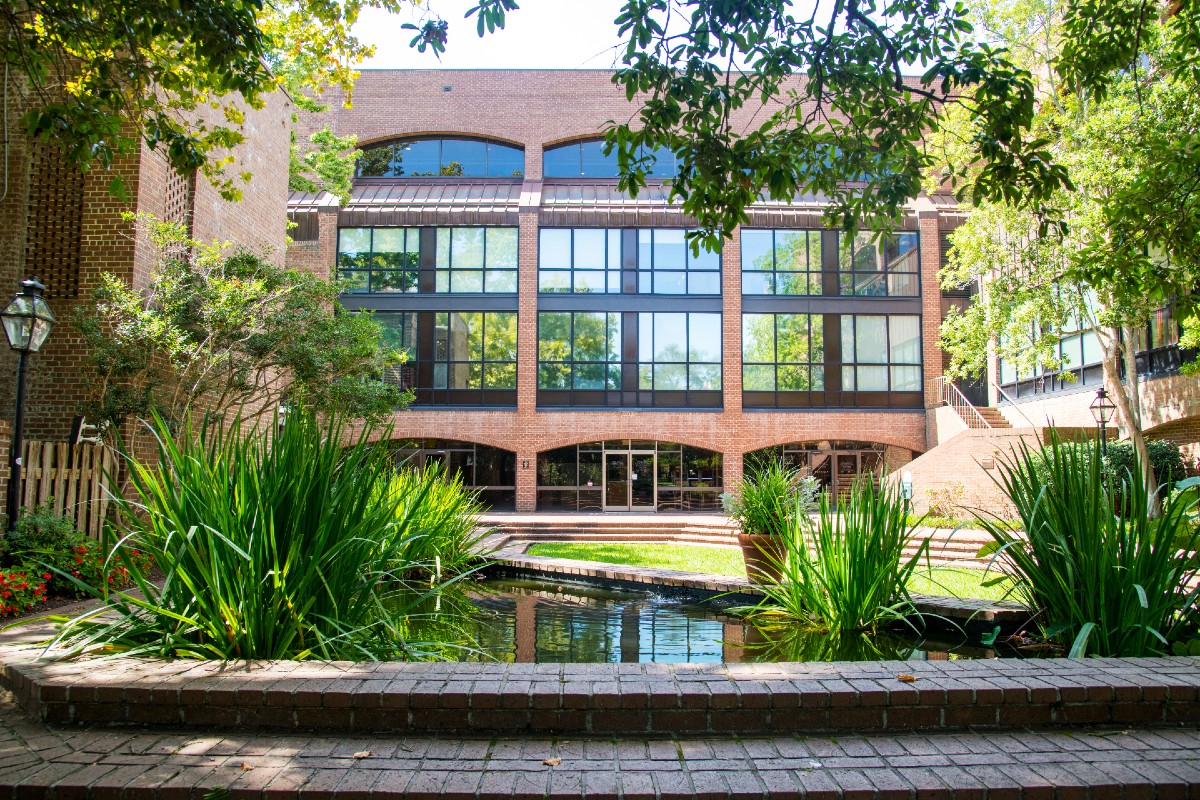STATEHOUSE REPORT | ISSUE 20.33 | AUG. 13, 2021
BIG STORY: Medicaid expansion popular to voters, but faces legislative challenges
NEWS BRIEFS: House committee to discuss use of $3B in federal funds
LOWCOUNTRY, Ariail: Grim reality
COMMENTARY, Brack: What happened to courage and pride in South Carolina?
SPOTLIGHT: AT&T
MY TURN, Ulbrich: Reviewing home rule, local government and redistricting
FEEDBACK: It’s time to protect the children of South Carolina; More
MYSTERY PHOTO: Brick and glass building
Medicaid expansion popular to voters, but faces challenges

By Al Dozier, special to Statehouse Report | There is strong support to expand the federal Medicaid program in the Palmetto State across party lines with nearly eight in 10 South Carolina voters ages 50 and older registering their support, according to a new study by AARP.
“We are seeing numbers that we’ve never seen before,” said Nikki Hutchison, associate state director for advocacy and governmental affairs for AARP in South Carolina.
A report on the study will soon be sent to lawmakers, Hutchison said.
Those findings could spark state leaders to reconsider a long-held stance against Medicaid expansion, which could bring millions to the state to provide health care to more than 200,000 uninsured state residents..
“There is a buzz that wasn’t there before,” said Patrick Cobb, communications director for Columbia’s AARP office. “But it has to go through a process.”
Nearly two -thirds of those surveyed say they would be extremely or very favorable toward state lawmakers who voted to expand Medicaid health care to South Carolina residents who earn less than $18,000 a year.
What expansion would mean

The financial benefit for the state would be huge, AARP said.
In the new incentive plan, the state would get about $790 million over two years through the American Rescue Plan, but would have to pay $95 million a year for its 10 percent share of expansion for state residents.
It’s money that “shouldn’t be left on the table,” said Cobb.
Sue Berkowitz, executive director of the S.C. Appleseed Legal Justice Center in Columbia, earlier this year said expansion made sense fiscally.
“Medicaid expansion has always been a cost-effective way for the state to get health care coverage to low-wage workers through a state/federal partnership with the state paying 10 percent and the feds paying 90 percent.”
Troubled waters ahead
S.C. Senate Minority Leader Brad Hutto, D-Orangeburg, said “it’s not going to happen,” even though the benefits would be huge.
He said the Republican opposition will be too strong to overcome, despite the benefits the state would receive
Hutto said he did not anticipate the AARP study would sway the opposition.
But House Minority Leader Todd Rutherford, D-Richland, said “the time has come” for the state to stop turning its back on millions that could have gone to health care for the past several years. If huge sums of tax money are available, it makes no sense to turn it down, he said.
“I’m hopeful,” he said of the current efforts under way to approve the expansion.
Instead of Medicaid expansion, it should be called “health care,” he said.
Gov. Henry McMaster has already announced strong opposition to the expansion.
“Gov. McMaster isn’t for sale, regardless of whatever ill-conceived ‘incentives’ congressional Democrats may come up with,” spokesman Brian Symmes said in a statement to the Associated Press about the expansion. “What the federal spending plan does is attempt to offer a short term solution for a long- term problem.”
- Al Dozier of Columbia is a veteran Statehouse reporter. Have a comment? Send to feedback@statehousereport.com
House committee to discuss use of $3B in federal funds

By Sam Spence, special to Statehouse Report | South Carolina legislators will meet starting next week to begin talks on how more than $3 billion in federal funds will be spent, with House lawmakers convening Tuesday in Columbia.
On the agenda for the SRS and ARPA Appropriations Ad Hoc Committee is how nearly $2.5 billion from the American Recovery Plan Act (ARPA) passed by Congress will be spent in the Palmetto State, as well as $525 million from a U.S. Department of Energy settlement over radioactive waste stashed at the federal Savannah River Site.
Generally, ARPA funds can be used for COVID-19 response, public-health and public-sector services and infrastructure spending on water, sewer and broadband needs.
Early talk on one possible use of ARPA funds includes picking up the tab on a $350 million portion of a massive container port expansion in North Charleston. Lawmakers have already pledged $200 million in state money to the project, which drew some criticism as it was briskly folded into state appropriations earlier this year.
“The virus has had an enormous impact on the economy, as you know, with logistics and the supply chain and things to help to streamline and facilitate that sort of flow we believe will be allowable,” Gov. Henry McMaster told The State in July.
Lawmakers will also start discussions on how to dole out $525 million from a Department of Energy settlement over nuclear waste kept past federal deadlines at the Savannah River Site near Aiken. Some $75 million of the $600 million overall deal has already been set aside for private lawyers hired by Attorney General Alan Wilson.
In other recent headlines:
![]() State passes 10,000 deaths due to COVID-19. The S.C. Department of Health and Environmental Control on Wednesday said the state reported 15 additional deaths blamed on COVID-19, pushing the state total past the 10,000 mark. More: WIS TV.
State passes 10,000 deaths due to COVID-19. The S.C. Department of Health and Environmental Control on Wednesday said the state reported 15 additional deaths blamed on COVID-19, pushing the state total past the 10,000 mark. More: WIS TV.
Census shows growth along coast, Charlotte area. South Carolina gained almost 500,000 people between 2010 and 2020, according to long-expected new figures released yesterday by the U.S. Census. The state’s 11 percent growth to 5.1 million people was clustered along the coast and in the Charlotte suburbs. The top three counties by population remain Greenville, Richland and Charleston. Just over half of the state’s 46 counties, most of them rural, lost population. Other results: The percentages of white and Black South Carolinians dropped while Hispanic or Latino residents rose from 5.1 percent to 6.9 percent. More: The State | The Post and Courier.
Voters beg legislators to end gerrymandering. Voters are complaining to state legislators about the ills of gerrymandered redistricting, including split precincts and communities, as they travel the state prior to working on plans to redraw legislative districts as required every 10 years. More: Charleston City Paper.
Feds approve S.C. plans for over $2B in federal funding. The U.S. Department of Education has approved South Carolina’s plan for $2.1 billion in federal aid for the classroom tied to the COVID-19 recovery. More: The Post and Courier
State animal shelters ask for public’s help with influx of pets. The state’s animal shelters have declared a “state of emergency” as a summer influx of abandoned pets and a lull in adoptions threaten to overwhelm the facilities. More: WCSC TV
Sam Spence is editor of the Charleston City Paper. Have a comment? Send to: feedback@statehousereport.com.
Grim reality

Cartoonist Robert Ariail always has an interesting take on what’s going on in South Carolina. His weekly “Lowcountry” strip is originally drawn for our sister publication, the Charleston City Paper. Love the cartoon? Hate it? What do you think: feedback@statehousereport.com. Check out the Best of Charleston 2021.
What happened to courage and pride in South Carolina?

By Andy Brack, editor and publisher | More than 10,000 South Carolinians have died in the last year and a half from COVID-19. With the availability of incredibly effective vaccines and the common-sense step of wearing masks in crowded places, we have the tools to win the COVID War.
 But too many people will continue to die because too many still aren’t vaccinated and too many get huffy about wearing masks when indoors. They talk about personal freedom instead of respecting community safety. They’re getting played by false Internet memes circulated by Russians and anti-vaxxers, instead of believing cold, hard facts from science. They conveniently forget how the vaccines they got when they were kids kept them from getting horrible diseases like polio, measles, rubella, diphtheria and smallpox.
But too many people will continue to die because too many still aren’t vaccinated and too many get huffy about wearing masks when indoors. They talk about personal freedom instead of respecting community safety. They’re getting played by false Internet memes circulated by Russians and anti-vaxxers, instead of believing cold, hard facts from science. They conveniently forget how the vaccines they got when they were kids kept them from getting horrible diseases like polio, measles, rubella, diphtheria and smallpox.
Vaccines work. Masking works. But South Carolina, like many Southern red states, has among the lowest vaccination rates in the country. This forces us to ask: Where is our sense of pride, our sense of dignity? Do we always have to be at the bottom of lists, especially when it’s relatively easy to get our state out of the cellar by getting people vaccinated?
Furthermore, if more people will get vaccinated and get to the top of the list, families throughout the state will be safer. Hospitals will be able to get back to treating people’s regular problems, not a pandemic. If the half of eligible South Carolinians who aren’t vaccinated get the shots, it probably would take just two months to create a safe environment across the state, which would generate a relatively quick return to normal instead of the slow drip of the continuing contagion that is locking down our day-to-day life and business.
People across South Carolina have pride in the state’s beautiful places, football teams, heritage, history, sense of independence and quality of life. Why can’t we have a statewide sense of pride in beating COVID-19? Why can’t everyone pull together, protect their families, protect their neighbors and protect their communities so we can get back to normal? We have the tools.
There’s more. Not only do citizens have a responsibility to get vaccinated, our leaders need to have the courage to lead and get beyond all of the emotional, political rhetoric that has infected common-sense, science-based reasons to get vaccinated and wear masks until things are safer.
We haven’t seen courage from our governor, Henry McMaster. Instead of pulling out all of the stops with campaign rallies in communities across the state to pump up the volume on vaccinations and masks, he makes meek suggestions as more people get the disease.
We also haven’t seen many state legislators pushing statewide safety against the pandemic. Rather, they hunker down too afraid to admit they were wrong to pass an anti-mask mandate which will lead to more school children getting COVID-19 until they can get vaccinated.

About the only leadership on display has come from Columbia Mayor Steve Benjamin and Columbia City Council. Earlier this month, Benjamin issued an emergency declaration requiring masks in most Columbia schools to protect students. On Aug. 11, council members voted 5-1 to approve that order.
That’s leadership. And all of our political leaders, regardless of party, need to be leading now, not hiding behind some poll or anti-science ideology. More cities and counties need to challenge the state’s dumb anti-masking law in court and by ordinance (remember home rule?) to lead our state toward safety from COVID-19.
This disease doesn’t care if you’re a Republican, Democrat or independent. It cares whether it can get inside you, infect you and make your life a living hell. But if we get vaccinated — and wear a mask when near others — we can make a quicker return to normal. Let’s get it done, South Carolina.
- Have a comment? Send to: feedback@statehousereport.com.
AT&T
 The public spiritedness of our underwriters allows us to bring Statehouse Report to you at no cost. Today’s featured underwriter is AT&T Inc.
The public spiritedness of our underwriters allows us to bring Statehouse Report to you at no cost. Today’s featured underwriter is AT&T Inc.
AT&T Inc. (NYSE:T) helps millions around the globe connect with leading entertainment, mobile, high speed Internet and voice services. We’re the world’s largest provider of pay TV. We have TV customers in the U.S. and 11 Latin American countries. We offer the best global coverage of any U.S. wireless provider*. And we help businesses worldwide serve their customers better with our mobility and highly secure cloud solutions.
- Additional information about AT&T products and services is available at http://about.att.com.
- Follow our news on Twitter at @ATT, on Facebook at http://www.facebook.com/att and YouTube at http://www.youtube.com/att.
* Global coverage claim based on offering discounted voice and data roaming; LTE roaming; voice roaming; and world-capable smartphone and tablets in more countries than any other U.S. based carrier. International service required. Coverage not available in all areas. Coverage may vary per country and be limited/restricted in some countries.
Reviewing home rule, local government and redistricting

By Holley Ulbrich, special to Statehouse Report | State legislators are holding meetings around the state to get citizens’ thoughts about how to redistrict as they finally get the Census figures from 2020. It seems like a good time to revisit the botched mess the General Assembly made of home rule in the 1970s in dealing with provisions of the 1895 Constitution under which all county business was run out of Columbia by legislative delegations.

In case you aren’t familiar with the term, “home rule” means that a state grants a certain degree of autonomy to local governments in how they raise and spend their money, organize their government, run their elections, staff their boards and commissions, and in general manage local affairs. Maybe even what they name their buildings and what statues grace the courthouse square!
Municipalities have some limited home rule, but they are carefully fenced in by stringent annexation laws and still have a lot of legislative dictation about how they raise and spend their money, among other issues. And it’s one size fits all—the same rules apply to Charleston and Six Mile as municipalities, Richland and Lee as counties. School districts, on the other hand, are totally nonuniform. Each is governed by a separate piece of legislation passed by the General Assembly in the distant past which can only be changed by—you guessed it!—new legislation in the General Assembly introduced by the legislative delegation.
Some of us remember the “good” old days when county government consisted of a sheriff, a jail and a county supervisor to take care of the roads, while everything else happened in Columbia. The county budget was passed by the General Assembly as a supply bill for each of the 46 counties. Each bill was introduced by the legislative delegation (the county’s single senator and its one or more representatives) who were the ones who voted to pass it, others just voting present. Members of county boards and commissions were appointed by the legislative delegation.
In the late 1960s, two Supreme Court decisions required that the rule of “one person, one vote” called for redrawing not only congressional districts but also everything down to city wards and school districts based on population. Unlike the federal government, this requirement applied to the state Senate as well as the House.
So gone were the days of one senator per county, which once allowed the state to be governed by the Barnwell ring and other coalitions of rural legislators at the expense of faster-growing urban and suburban counties. Now small counties might have no resident senator, large counties would have several senators, and most counties would find that part of their county shared a senator with another county. The all-powerful single senator would no longer reign supreme over county government (as well as school districts, at least in matters of consolidating or splitting districts or the size and composition of school boards). House districts, likewise, often cross county lines, so that members of both House and Senate may serve on more than one county delegation.
After some experimentation, the present system was put in place. When the dust settled, South Carolina’s 1970s constitutional revision resulted in a modest expansion of home rule for counties, no changes for school districts or municipalities, and the increase in legislation on local matters that applied to all local governments regardless of population, location or rural/urban character. Examples include the Heritage Act and restricting the zoning authority of counties with respect to hog farms and other agricultural uses.
In a state that proudly proclaims its hostility to the federal government and demands respect for states’ rights, there seems to be no comparable respect for the rights of local governments to be treated as independent, competent and deserving of the powers and the flexibility they need to do their work. We can do better.
After the 2020 Census is finally released, state Senate districts along with everything else will again have to be redrawn. As my good friend Lynn Teague reminds us, at the congressional level there is some partisan gerrymandering, but for House and Senate districts at the state level incumbent protection plays a larger role in how the lines are drawn. If we just keep re-electing incumbents, there is little hope for change in home rule. Certainly, making Senate districts more equal in size should improve representation and perhaps lead to more competitive elections, and even hearing concerns about home rule. While redistricting in the 1970s gave citizens what little home rule they have, it is probably true that no amount of redistricting will correct the widespread and continuing preemption of local authority by state legislators and redirect their attention to issues that are statewide rather than local in nature.
The county legislative delegation continues to make important decisions that override what would normally be the purview of the elected county government and the elected school boards. In the case of school districts, changes in the structure (number of districts, composition of boards) were made in Pickens, Fairfield and Sumter counties in recent years that were widely opposed within the county. A primary source of the problem lies in the Senate, where counties with more than one senator representing at least a part of a county split the votes among senators on a proportional basis—the share of each county’s population they represent. In the Pickens case, then S.C. Sen. Larry Martin represented 81 percent and Sen. Thomas Alexander (who is from Oconee County) 19 percent. The Clemson area, which is in Alexander’s district, has no effective voice on local matters in the Senate, specifically the change in the makeup of the school board in removing the at-large seats. Other counties have had similar problems with school district structure and the inability of a substantial number of citizens to influence these decisions. In the case of Dillon County, many of whose citizens have pleaded to have elected rather than appointed school boards, the request has fallen on deaf ears with no resident senator and only one resident representative to listen to their concerns. Sounds like taxation without representation!
County delegations also continue to play a major role in appointments to county boards and commissions, including election commissions. Those appointments are made by delegations that include legislators who reside in other counties. Many small counties have no resident senator at all. County councils must fund the work of these boards and commissions but have no authority over them.
Redistricting will not solve either of these problems. The role of the county delegation is an anachronism dating from the Jim Crow era. In a state that proudly proclaims its hostility to the federal government and demands respect for states’ rights, there seems to be no comparable respect for the rights of local governments to be treated as independent, competent and deserving of the powers and the flexibility they need to do their work. We can do better.
Holley Hewitt Ulbrich is an Alumni Distinguished Professor Emerita of Economics at Clemson University, specializing in state and local public finance. Have a comment? Send to: feedback@statehousereport.com
It’s time to protect the children of South Carolina
To the editor:
![]() Now is the time to put politics and partisanship aside and focus on the health of our children. As a pediatrician, president of the S.C. Chapter of the American Academy of Pediatrics (AAP) and representative of the 750 pediatricians in the state, I am asking you to contact your elected officials and urge them to reverse the law that forbids public schools from requiring masks.
Now is the time to put politics and partisanship aside and focus on the health of our children. As a pediatrician, president of the S.C. Chapter of the American Academy of Pediatrics (AAP) and representative of the 750 pediatricians in the state, I am asking you to contact your elected officials and urge them to reverse the law that forbids public schools from requiring masks.
The Delta variant of COVID-19 is significantly more contagious than the original strain in circulation over the past school year. Many schools that have already started back are experiencing outbreaks, and we must reinstate mask requirements for children in schools and allow school districts to act in the interest of maximum safety for children.
The fact is that anyone at any age can become infected with COVID-19, but masking reduces that risk and vaccines reduce both risk and severity of illness. Children less than 12 cannot yet receive the vaccine, and about only 25 percent of 12- to 18-year-olds are vaccinated, so why aren’t we doing everything we can to reduce their risks?
Masking in schools is now also urged by the CDC, AAP and S.C. Department of Health and Environmental Control. The top medical experts and scientists in the U.S. and S.C. are in agreement, but our politicians are not. Find and contact your legislators at scstatehouse.gov/legislatorssearch. By working together we can beat COVID!
— Dr. Robert Saul, president, S.C. chapter of the American Academy of Pediatrics, Greenwood, S.C.
The choice of NO CHOICE
To the editor,
This is a pandemic of the unvaccinated for the most part. Children are part of the unvaccinated and they are showing up at hospitals.
South Carolina lags by two to three weeks in the explosion of cases involving the hospitalization of children in Florida. It’s another masks-are-optional-in-schools state. Our future is in their present. So we can learn.
Go to the neighborhood school and there you will find optional masking among students and staff. A good percentage will be wearing masks. They or their parent do not want them sick, physically damaged for their life, incapacitated by long-COVID, or, in a rare case, dead.
At the state Chamber, our governor and the freedom-loving cabal of legislative supporters have developed policies that they think implements a heretofore missing freedom. Added to South Carolina’s portfolio of freedoms is freedom from masking.
Mandating that local government bodies cannot mandate the wearing of masks is providing health policy nonsense. School districts that have more than 5 percent enrolled in remote learning are penalized financially to the tune of a 47 percent reduction of some of the budgeted lines. Setting up the no choice-no masks required (poolicy), no remote instruction is available.
We have been given the only choice of accepting NO CHOICE to respond to the pandemic threats. Boxed in. No way out. Unable to move. Strangled in our beds by failed health policy.
— Fred Palm, Edisto Island, S.C.
On South Carolina’s henhouse redistricting politics
To the editor:
Great analysis of redistricting. Thanks for the history lesson and truth.
— Lillian Brock Flemming, Greenville, S.C.
Send us your thoughts. We receive a few comments a week and look forward to publishing. But often we can’t because we can’t verify the identity of the writer. To be published, you’ve got to provide us with contact information so we can verify your letters. Verified letters to the editor are published weekly. We reserve the right to edit for length and clarity. Comments are limited to 250 words or less. Please include your name and contact information.
- Send your letters or comments to: feedback@statehousereport.com
Brick and glass building

You might have come across this brick and glass building with its contemplative garden in your walks around the Holy City. But what and where is it? Send your guess to feedback@statehousereport.com — and remember to include your name, home city and contact information.
 Last week’s mystery, “Maritime mystery,” shows a crane at an Ashley River dock at the U.S. Coast Guard Station in Charleston.
Last week’s mystery, “Maritime mystery,” shows a crane at an Ashley River dock at the U.S. Coast Guard Station in Charleston.
Congratulations to these four eagle-eyed readers who solved the mystery: George Graf of Palmyra, Va.; Will Bradley of Las Vegas, Nevada; and Jay Altman and Elizabeth Jones of Columbia.
- Send us a mystery. If you have a photo that you believe will stump readers, send it along (but make sure to tell us what it is because it may stump us too!) Send to: feedback@statehousereport.com and mark it as a photo submission. Thanks.
ORDER NOW: Copies are in Lowcountry-area bookstores now, but if you can’t swing by, you can order a copy online today.
ABOUT STATEHOUSE REPORT
Statehouse Report, founded in 2001 as a weekly legislative forecast that informs readers about what is going to happen in South Carolina politics and policy, is provided to you at no charge every Friday.
- Editor and publisher: Andy Brack, 843.670.3996
Donate today
We’re proud to offer Statehouse Report for free. For more than a dozen years, we’ve been the go-to place for insightful independent policy and political news and views in the Palmetto State. And we love it as much as you do.
But now, we can use your help. If you’ve been thinking of contributing to Statehouse Report over the years, now would be a great time to contribute as we deal with the crisis. In advance, thank you.
Buy the book
Now you can get a copy of editor and publisher Andy Brack’s We Can Do Better, South Carolina! ($14.99) as a paperback or as a Kindle book ($7.99). . The book of essays offers incisive commentaries by editor and publisher Andy Brack on the American South, the common good, vexing problems for the Palmetto State and interesting South Carolina leaders.
More
- Mailing address: Send inquiries by mail to: P.O. Box 21942, Charleston, SC 29413
- Subscriptions are free: Click to subscribe.
- We hope you’ll keep receiving the great news and information from Statehouse Report, but if you need to unsubscribe, go to the bottom of the weekly email issue and follow the instructions.
- Read our sister publications: Charleston City Paper (every Wednesday) | Charleston Currents (every Monday).
- © 2021, Statehouse Report, a publication of City Paper Publishing, LLC. All rights reserved.



